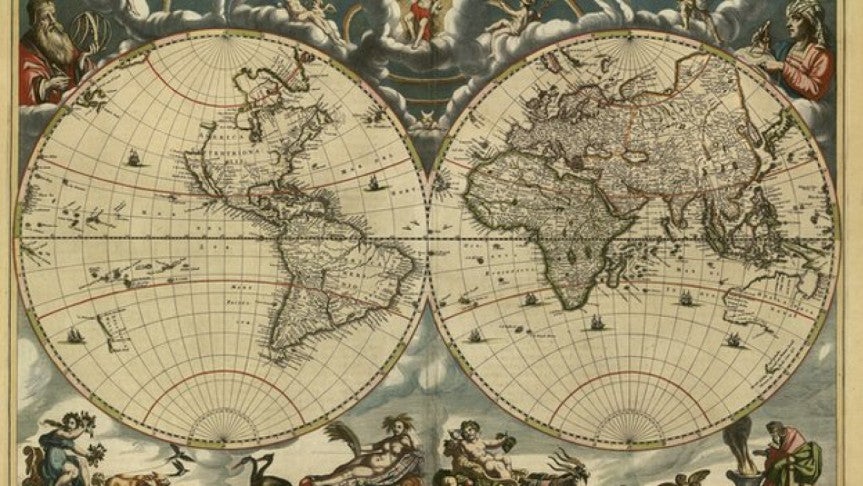The Age of man 'started in 1610'

According to a new study, the Anthropocene - a new geological time period that marks the ‘Age of man’ - began in 1610, reports BBC.
Scientists believe that the arrival of Europeans in the Americas had an unprecedented impact on the planet, marking the dawn of this new epoch.
The findings are published in the journal Nature.
Others say that the industrial revolution or the first nuclear tests better signal the start of the Anthropocene.
While some believe the exact date for a new epoch can only be determined with the benefit of thousands or even millions of years of hindsight.
An international Anthropocene Working Group is currently reviewing the evidence and will announce its favoured start date next year.
Golden spikes
Geologists carve up Earth's history into chunks that reflect times of significant change on the planet, perhaps as a result of continental movement, a big asteroid strike, or a major shift in climate.
To pinpoint the start of this new phase, geologists are looking for a clear signal, described as a ‘golden spike’, that will be captured in rocks, sediments or ice.
Mark Maslin, from University College London, a co-author of the paper, said: ‘We look for these golden spikes - a real point in time when you can show in a record when the whole Earth has changed.
‘If you look back through the entire, wonderful geological timescale, we have defined almost every boundary in that way.’
The study suggests that one such golden spike places the start of the Anthropocene in 1610.
The researchers say the arrival of the Europeans in the Americas 100 years earlier was the start of a major global transformation.
Co-author Dr Simon Lewis, also from UCL, said: ‘The rapid global trade after that time moved species around.
‘Maize from Central America was grown in southern Europe and Africa and China. Potatoes from South America were grown in the UK, and all the way through Europe to China. Species went the other way: wheat came to North America and sugar came to South America - a real mixing of species around the world.
‘We saw these species jump continents, which is a geologically unprecedented impact, setting Earth off on a new evolutionary trajectory.’
Ancient pollen found in sediments provides a record of this change, but the team says another golden spike relates to deadly diseases brought into the Americas from Europe.
‘Around 50 million people (in the Americas) died, and most of those people were farmers,’ Dr Lewis told the BBC World Service's Science in Action programme.
‘And this farmland grew back to the original vegetation - tropical forest, dry forest or savannah. And about half the dry weight of a tree is carbon, so all that growing vegetation removed enough carbon from the atmosphere to see a pronounced dip in the global atmospheric carbon dioxide concentration that can be seen in ice core records.’
‘It provides an exact marker of the Anthropocene at 1610, the lowest point of CO2 in the ice-core record at that time.’
Atomic bomb
Nuclear weapons tests in the mid-20th Century have also left a clear signal of humanity's impact on the Earth
The researchers also said another date for the new epoch could be 1964, when the nuclear tests of the 1940s, 50s and early 60s came to an end after a ban came into force.
A golden spike is provided by an increase in radioactive carbon in the atmosphere while the tests were taking place, followed by a very sharp drop off when they stopped.
But Prof Maslin said that while the signal was very sharp, the radioactivity was not related to other great changes taking place at that time.
He explained: ‘In the mid-1960s, there is a huge change in everything around the planet, which is called the 'great acceleration' - with the population increasing by 2% per year, unprecedented changes in agriculture and food production - but the marker doesn't link to that in any shape or form.’
Commenting on the research, Dr Jan Zalasiewicz, from the University of Leicester, who chairs the Anthropocene Working Group, said it was an interesting piece of work with some ‘intriguing ideas’.
‘The working group will certainly be discussing them,’ he told BBC News.
‘It adds positively to the overall debate on the Anthropocene, and to the growing number of suggestions about where it should start.
‘The 1610 suggestion clearly reflects a historically important event, though it would need more evidence, I think, whether the criteria they suggest would work better than the multiple signals now known to be associated with the mid-20th century 'great acceleration'.’

 NTV Online
NTV Online




